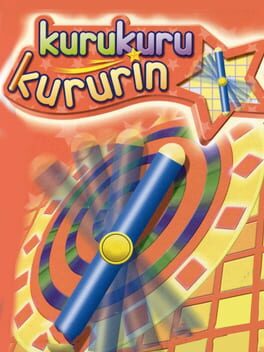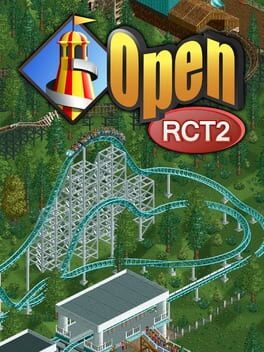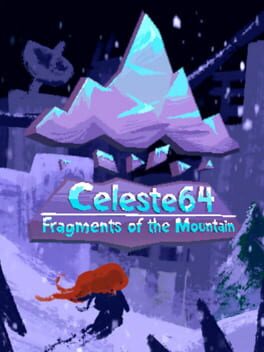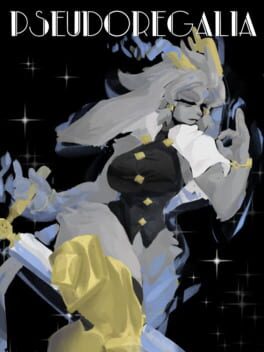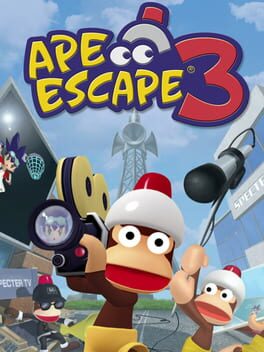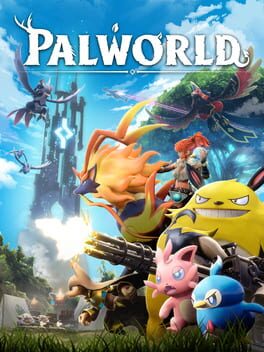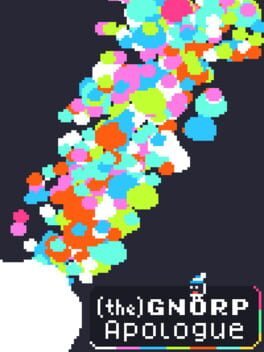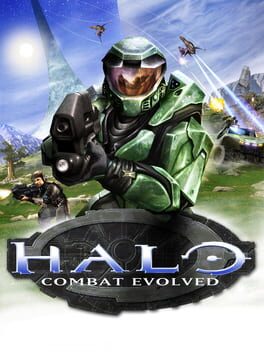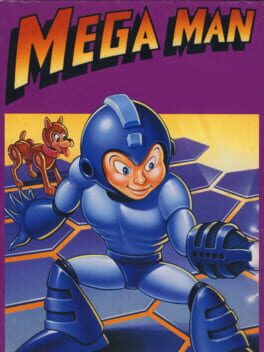GirambQuamb
19 Reviews liked by GirambQuamb
Kuru Kuru Kururin
2001
Incredibly rewarding game that asks so much executional precision by the end, but is always fair.
(warning most of this review is actually about the Souls games, coming from someone who hasn't liked them so far and who also hasn't put more than like 4 hours total into the whole series lol)
When it comes to these sorts of skill games, I feel like I'm always going to prefer visually clean games that let you get immediately back into the action on a failure. Your obstacles are always 100% clear and every single mistake is immediately obvious and understood. There's no bloat, no wasted space or time, just pure execution.
I like to write them off a lot as a joke, but I do really think my tastes are just fundamentally incompatible with the Souls games as they currently exist. I am never going to enjoy a game that asks a lot of me, and then punishes failure with even as little as 2 seconds of waiting before I'm allowed to try again. When you're locked in, 2 seconds is a long fucking time and it will almost always knock you out of the zone.
And I feel like once you put these execution games into 3D, there's a million more things that can go wrong as far as visual clarity is concerned, and when every boss has different animations and attack patterns, it stops feeling like a challenge you can chip away at and slowly improve with. My go-to examples of mechanically challenging games that I actually like are usually Katana Zero and Celeste, but playing this I realize that it's not just the fast respawn, it's the clarity and total control that 2D offers (and also some 3D shooters, my explanation for including these would just be the same as this part of this Matthewmatosis video that explains why shooters got big during the switch to 3d so just watch that if you're interested).
Back to the topic, trying a level 40 times in Kurukuru Kururin is hardly out of the ordinary. Trying a boss in a souls game 40 times is, from what I understand, a nightmare and something you only get to if you're really having trouble with something. In Kurukuru Kururin, trying something 40 times and seeing that slow, incremental progress, getting just a bit further in the level each time, culminating in beating it? That's perfect, that's exactly what I want from games that ask me to "get good". I just don't see that happening for me with the souls games--given the time length of bosses, the actual mechanical difficulty is going to have to go down, and so the maneuvers feel less satisfying to pull off, and when you're getting knocked out of the zone every time you do make a mistake. Nightmare. "Get good" games should, ideally, maximize the amount of time spent on getting good at them, a loss is punishment enough. Kurukuru Kururin trims every single piece of fat, you're controlling a spinning rod in a maze, nothing more, nothing less, and in its simplicity it's definitely one of the best skill-based games I've played so far.
(warning most of this review is actually about the Souls games, coming from someone who hasn't liked them so far and who also hasn't put more than like 4 hours total into the whole series lol)
When it comes to these sorts of skill games, I feel like I'm always going to prefer visually clean games that let you get immediately back into the action on a failure. Your obstacles are always 100% clear and every single mistake is immediately obvious and understood. There's no bloat, no wasted space or time, just pure execution.
I like to write them off a lot as a joke, but I do really think my tastes are just fundamentally incompatible with the Souls games as they currently exist. I am never going to enjoy a game that asks a lot of me, and then punishes failure with even as little as 2 seconds of waiting before I'm allowed to try again. When you're locked in, 2 seconds is a long fucking time and it will almost always knock you out of the zone.
And I feel like once you put these execution games into 3D, there's a million more things that can go wrong as far as visual clarity is concerned, and when every boss has different animations and attack patterns, it stops feeling like a challenge you can chip away at and slowly improve with. My go-to examples of mechanically challenging games that I actually like are usually Katana Zero and Celeste, but playing this I realize that it's not just the fast respawn, it's the clarity and total control that 2D offers (and also some 3D shooters, my explanation for including these would just be the same as this part of this Matthewmatosis video that explains why shooters got big during the switch to 3d so just watch that if you're interested).
Back to the topic, trying a level 40 times in Kurukuru Kururin is hardly out of the ordinary. Trying a boss in a souls game 40 times is, from what I understand, a nightmare and something you only get to if you're really having trouble with something. In Kurukuru Kururin, trying something 40 times and seeing that slow, incremental progress, getting just a bit further in the level each time, culminating in beating it? That's perfect, that's exactly what I want from games that ask me to "get good". I just don't see that happening for me with the souls games--given the time length of bosses, the actual mechanical difficulty is going to have to go down, and so the maneuvers feel less satisfying to pull off, and when you're getting knocked out of the zone every time you do make a mistake. Nightmare. "Get good" games should, ideally, maximize the amount of time spent on getting good at them, a loss is punishment enough. Kurukuru Kururin trims every single piece of fat, you're controlling a spinning rod in a maze, nothing more, nothing less, and in its simplicity it's definitely one of the best skill-based games I've played so far.
OpenRCT2
2014
Music highlight. Estimated read time: 3~ minutes for OpenRCT2, 3~ minutes for venting. lol.
"Do I put my review on RollerCoaster Tycoon 1 or RollerCoaster Tycoon 2? And which version..." I don't know why I fretted over this when I played the entirety of both base games via OpenRCT2. It's also with this that I break my oldest "running gag" (implying it's funny) with this account, which is that I'm always playing RollerCoaster Tycoon 2; by unmarking it as "playing" and replacing that status with this. More on this later.
I could gush endlessly about RollerCoaster Tycoon 1 & 2; they're in my mind the best jumping-off point for getting into management games, which in turn would make the entry into things like RTS easier for many. They're not without their flaws, though; I'll knock those out immediately. The most obvious one is that many things aren't explained to the player, but 95% of the time they are shown; the remaining 5% can ruin your scenario play, though, such as guest weight or ride requirements to avoid stat penalties... wait, hold on, don't go anywhere, I know that sounded like nerd shit... okay, it kind of is, but it's not that involved, I swear. "Learning" these games is incredibly easy if you observe interactions; though one plugin/mod I see people use is automatic price manager, and I personally think it takes a lot out of the game; you can find out how much you can sell something for by simply raising the price until people stop buying, or the inverse by lowering until people start buying. I mention this interaction specifically because this is how most things go with the game; if you're not sure, just do something and observe; it's not a particularly obtuse game except in some edge cases. That said, I'll recommend some very basic plugins for OpenRCT2 that help immensely with onboarding; they do not make the game easier, they just integrate relevant information that you would be wiki diving for in the first place.
Where these games shine is in the sheer player expression they allow for completing the scenarios, or in ride recreation, or scenery/decor, just general theming. The scenario difficulty scales fairly linearly in RCT1 with enough wiggle room to allow most players to not only learn but also express themselves (reasonably; don't spam too much or you'll go broke!). RCT2 had the problem of inexplicably ordering scenarios within each difficulty category alphabetically, meaning for many, they had an arduous first scenario in the form of Crazy Castle, which more experienced players almost unanimously agree should’ve been placed in Intermediate rather than Beginner anyways. OpenRCT2 now defaults to a difficulty sorting for RCT2's scenarios I believe, which essentially everyone recommends. Of course, this is mostly irrelevant if you played one or the other to completion and then started on the others' scenarios, as you'd already be accustomed to it, but it's yet another tweak OpenRCT2 makes that improves the experience for everyone.
...
"More on this later.": There is a weird fetishism from the more.. "niche" side of game review/criticism/analysis, a patriotic sense of obligation and pride in always playing, reviewing, and talking about The Original Version of something, often knowing full well that better versions of the game exist, and to not just make it a matter of preference but to actively disregard or dissuade playing games or such projects. To a degree, I felt this rub off on me from about 2015-2018 when I started collecting retro consoles like the PlayStation 3 and my dozens-long list of CRTs (essay on this some other time)
This isn't wholly unjustified, however, as for years and still going, many gamers will wholesale write off anything older than them as being outdated and not worth playing. In the case of OpenRCT2 all it really does is make the game playable on modern operating systems with the utmost basic quality-of-life changes (such as raising and lowering single tile placements without having to adjust the terrain first; things people far more into the game back in the day would enable tile editor for anyways, or one more significant, immensely helpful thing; but I'll let you see if you can figure out what that is in my playthrough of Micro Park. (timestamped to nudge you closer to it)
Somewhere along the way, I feel like the relatively young medium of video games skipped from being underbaked to overcooked in their analyses; a lack of brevity and/or concision, often over-analyzing every minute gameplay interaction for seemingly no reason other than to point out that they notice these things exist. It really shouldn't be warranted as a baseline component to a review unless you're clarifying something in active debate; most of it comes off as petulant bickering for little reason other than wilful disengagement.
To make matters worse, it's often coated with almost twice as much wordage trying to justify its position in the first place, as if the opinion piece of a cold, pessimistic burnout─the alphabet soup concocted in a flurry with more passion than any second given to the actual piece being discussed─ever needed one to begin with. It's just an opinion, after all. But maybe that's what's most upsetting from that perspective? That it is just that, and even if influential to a degree most can only dream of, still ultimately means little towards swaying the perception of the object of discussion.
O hypocrite that I am, for herein lies borderline word salad lamenting such an angle in the first place; oh well. It all wraps around to being fetishistic about things deemed historically significant, assigning them prestige and sacrality to be both immune from criticism and ammunition against that which deviates even a little.
Perhaps a more concentrated example is the inconsistency in perception around Minecraft (2009), specifically ""old"" Minecraft, where a very loud minority decry the game as having fallen off, being altered too much, etc.; the inconsistency of when it fell off would be hilarious if it weren't so depressing and laden with real-time demonstrations of parroting and a density of nostalgia bias so immense it makes Ocarina of Time look like a contrarian's pick. A defense of the old does not need to be propped up with slander of the new; that's just conservatism for video game art hoes.
Video games died in 1999, they'll say, which is news to me, but if that's true, then I'm pretty happy playing whatever this software is called from 2002, 2012, and 2022 as well.
Where to buy RollerCoaster Tycoon 1: GOG or Steam
Where to buy RollerCoaster Tycoon 2: GOG or Steam
OpenRCT2 project, for playing the games on modern operating systems: OpenRCT2
Launcher/updater for OpenRCT2/OpenLoco: OpenLauncher
Recommended OpenRCT2 plugins: Stat Requirement Checklist, Live Ride Measurements, Park Rating Inspector.
"Do I put my review on RollerCoaster Tycoon 1 or RollerCoaster Tycoon 2? And which version..." I don't know why I fretted over this when I played the entirety of both base games via OpenRCT2. It's also with this that I break my oldest "running gag" (implying it's funny) with this account, which is that I'm always playing RollerCoaster Tycoon 2; by unmarking it as "playing" and replacing that status with this. More on this later.
I could gush endlessly about RollerCoaster Tycoon 1 & 2; they're in my mind the best jumping-off point for getting into management games, which in turn would make the entry into things like RTS easier for many. They're not without their flaws, though; I'll knock those out immediately. The most obvious one is that many things aren't explained to the player, but 95% of the time they are shown; the remaining 5% can ruin your scenario play, though, such as guest weight or ride requirements to avoid stat penalties... wait, hold on, don't go anywhere, I know that sounded like nerd shit... okay, it kind of is, but it's not that involved, I swear. "Learning" these games is incredibly easy if you observe interactions; though one plugin/mod I see people use is automatic price manager, and I personally think it takes a lot out of the game; you can find out how much you can sell something for by simply raising the price until people stop buying, or the inverse by lowering until people start buying. I mention this interaction specifically because this is how most things go with the game; if you're not sure, just do something and observe; it's not a particularly obtuse game except in some edge cases. That said, I'll recommend some very basic plugins for OpenRCT2 that help immensely with onboarding; they do not make the game easier, they just integrate relevant information that you would be wiki diving for in the first place.
Where these games shine is in the sheer player expression they allow for completing the scenarios, or in ride recreation, or scenery/decor, just general theming. The scenario difficulty scales fairly linearly in RCT1 with enough wiggle room to allow most players to not only learn but also express themselves (reasonably; don't spam too much or you'll go broke!). RCT2 had the problem of inexplicably ordering scenarios within each difficulty category alphabetically, meaning for many, they had an arduous first scenario in the form of Crazy Castle, which more experienced players almost unanimously agree should’ve been placed in Intermediate rather than Beginner anyways. OpenRCT2 now defaults to a difficulty sorting for RCT2's scenarios I believe, which essentially everyone recommends. Of course, this is mostly irrelevant if you played one or the other to completion and then started on the others' scenarios, as you'd already be accustomed to it, but it's yet another tweak OpenRCT2 makes that improves the experience for everyone.
...
"More on this later.": There is a weird fetishism from the more.. "niche" side of game review/criticism/analysis, a patriotic sense of obligation and pride in always playing, reviewing, and talking about The Original Version of something, often knowing full well that better versions of the game exist, and to not just make it a matter of preference but to actively disregard or dissuade playing games or such projects. To a degree, I felt this rub off on me from about 2015-2018 when I started collecting retro consoles like the PlayStation 3 and my dozens-long list of CRTs (essay on this some other time)
This isn't wholly unjustified, however, as for years and still going, many gamers will wholesale write off anything older than them as being outdated and not worth playing. In the case of OpenRCT2 all it really does is make the game playable on modern operating systems with the utmost basic quality-of-life changes (such as raising and lowering single tile placements without having to adjust the terrain first; things people far more into the game back in the day would enable tile editor for anyways, or one more significant, immensely helpful thing; but I'll let you see if you can figure out what that is in my playthrough of Micro Park. (timestamped to nudge you closer to it)
Somewhere along the way, I feel like the relatively young medium of video games skipped from being underbaked to overcooked in their analyses; a lack of brevity and/or concision, often over-analyzing every minute gameplay interaction for seemingly no reason other than to point out that they notice these things exist. It really shouldn't be warranted as a baseline component to a review unless you're clarifying something in active debate; most of it comes off as petulant bickering for little reason other than wilful disengagement.
To make matters worse, it's often coated with almost twice as much wordage trying to justify its position in the first place, as if the opinion piece of a cold, pessimistic burnout─the alphabet soup concocted in a flurry with more passion than any second given to the actual piece being discussed─ever needed one to begin with. It's just an opinion, after all. But maybe that's what's most upsetting from that perspective? That it is just that, and even if influential to a degree most can only dream of, still ultimately means little towards swaying the perception of the object of discussion.
O hypocrite that I am, for herein lies borderline word salad lamenting such an angle in the first place; oh well. It all wraps around to being fetishistic about things deemed historically significant, assigning them prestige and sacrality to be both immune from criticism and ammunition against that which deviates even a little.
Perhaps a more concentrated example is the inconsistency in perception around Minecraft (2009), specifically ""old"" Minecraft, where a very loud minority decry the game as having fallen off, being altered too much, etc.; the inconsistency of when it fell off would be hilarious if it weren't so depressing and laden with real-time demonstrations of parroting and a density of nostalgia bias so immense it makes Ocarina of Time look like a contrarian's pick. A defense of the old does not need to be propped up with slander of the new; that's just conservatism for video game art hoes.
Video games died in 1999, they'll say, which is news to me, but if that's true, then I'm pretty happy playing whatever this software is called from 2002, 2012, and 2022 as well.
Where to buy RollerCoaster Tycoon 1: GOG or Steam
Where to buy RollerCoaster Tycoon 2: GOG or Steam
OpenRCT2 project, for playing the games on modern operating systems: OpenRCT2
Launcher/updater for OpenRCT2/OpenLoco: OpenLauncher
Recommended OpenRCT2 plugins: Stat Requirement Checklist, Live Ride Measurements, Park Rating Inspector.
This review contains spoilers
Oh my god I love this little game.
For what it is (a tiny 3D platformer made in a week), it plays extremely well. There are some things from Celeste that aren't nearly as functional when brought over to 3D, but a lot of the polish still persists. Dash jumps and the new side flips (a la Mario games) feel very nice, and I love that dash jumps give you bonus speed on the ground when performed in the right context. It really does feel clean and fun to move around, which is a huge achievement for a game this size. Some of the puzzles and little secrets throughout this game really nailed the N64 3D platformer magic for me, as well.
Celeste is one of my favourite games, and I'm a huge N64 enthusiast. This game was tailor-made for me. All that being said, the visual design was hit or miss for me. A lot of elements look amazing and really nailed the "Celeste, but in 3D" vibe, but I wasn't really sold on the character models and the sheer amount of fog. I spent a good while trying to find my last few strawberries and always wished I could see a bit better into the distance. In terms of sound design, however, I have nothing but praise. The music nailed the N64 aesthetic in the main level, while the cassette stages had me grinning non-stop the moment I heard that goofy Mario Sunshine-esque song.
That can actually sum up a lot of this game for me. Goofy, but polished and fun, leaving a big ol' grin on my face for the majority of it.
Also Madeline went on to date Theo's sister and I love that.
For what it is (a tiny 3D platformer made in a week), it plays extremely well. There are some things from Celeste that aren't nearly as functional when brought over to 3D, but a lot of the polish still persists. Dash jumps and the new side flips (a la Mario games) feel very nice, and I love that dash jumps give you bonus speed on the ground when performed in the right context. It really does feel clean and fun to move around, which is a huge achievement for a game this size. Some of the puzzles and little secrets throughout this game really nailed the N64 3D platformer magic for me, as well.
Celeste is one of my favourite games, and I'm a huge N64 enthusiast. This game was tailor-made for me. All that being said, the visual design was hit or miss for me. A lot of elements look amazing and really nailed the "Celeste, but in 3D" vibe, but I wasn't really sold on the character models and the sheer amount of fog. I spent a good while trying to find my last few strawberries and always wished I could see a bit better into the distance. In terms of sound design, however, I have nothing but praise. The music nailed the N64 aesthetic in the main level, while the cassette stages had me grinning non-stop the moment I heard that goofy Mario Sunshine-esque song.
That can actually sum up a lot of this game for me. Goofy, but polished and fun, leaving a big ol' grin on my face for the majority of it.
Also Madeline went on to date Theo's sister and I love that.
Journey
2012
At this point, I feel like I’ve been playing Journey for half of my life. I’ve played through underwater Journey, forest Journey, air Journey, space Journey, cat Journey, and even boring Journey. Yet upon my yearly ascent in the original Journey on New Year’s Day, I find myself just as floored as when I first picked it up years ago, in spite of clone after clone exhausting my goodwill. What exactly then, is present in the original’s realized game design philosophy that every other spiritual successor has found themselves bereft of?
To answer this question, I want you to imagine a world where Journey doesn’t exist. A world where the formula to indie developers meant something more than just mindlessly tilting up on the left joystick to walk towards the next checkpoint while some narrator waxed poetic in the background. Before Journey, before Flower even, the closest ancestor we had was Ico. Fumito Ueda described his game as an execution of “boy meets girl,” and what it boiled down to was a minimalist adventure game with some puzzles cleverly disguised as platforming and timing segments. Occasionally, you also whack a few shadows while protecting and pulling your female companion Yorda through vast and still castle ruins. It wasn’t a perfect game by any means; the combat was frankly tedious, Yorda lacked much of an identity outside of pointing at objects of interest/opening doors/getting kidnapped, and at the end of the day, there really wasn’t much in the way of a balanced and developed relationship when the player was calling all the shots, but it was still the start of something beautiful. It wasn’t mechanically complex or esoteric in any fashion, but it was different. It was different, and it felt dangerous.
This write-up is not intended to be a critique of Ico, nor is it meant to imply that games proceeding Team Ico's philosophy of “design by subtraction” have since been inferior. Rather, I bring up Ico in particular, because there seems to be this general perception that minimalism results in a crippling lack of mechanical depth. That is, many seem to believe that discarding and minimizing a game’s various elements results in a dearth of tangible mechanics or imagery to cling onto, and thus appears to result in an empty and vacuous experience with little to justify further replays or deeper dives. To me though, this line of thought fundamentally misunderstands the purpose of addition by subtraction. It was never about creating mechanically deep systems with limitless possibilities like an immersive sim or a sandbox. Rather, the philosophy aimed to remove excess layers that distracted from the game’s “more realistic feeling of presence”, such as removing optional bosses and landmarks in Shadow of the Colossus or reducing enemy types in Ico to just a single design. In fairness, the goal wasn't just to remove extraneous elements that made something feel overly “gamey,” but also to marry mechanics in a way where the invisible layer of intended design never made itself too apparent (i.e. hiding the user interface in Shadow of the Colossus outside of fights). It was not just addition by subtraction; it was also addition through illusion.
To that end, I firmly believe that Journey is the best Team Ico game that Fumito Ueda never directed. Journey’s design philosophy was not necessarily revolutionary for its time, considering its predecessors in the forms of Flower and Ico, nor was its ultimate goal of reaching a final destination via walking/jumping/flying mechanics particularly exemplary. What was exemplary was its level of care and precision in how it implemented said minimalist design philosophy. Every time I play through Journey, I pick up more subtle details through its fusion of audio-visual presentation and gameplay that seemed so clear and intuitive that I had taken their presence for granted. There are the obvious strengths, like how Journey wordlessly conveys your path forward by keeping the shining peak of the mountain visible at all times while outside, or how it uses consistent visual language through cloth creatures and strips to demarcate safe zones where the player can recharge their scarf. But there’s more beneath the surface; what about the game's sneaky introduction to the sand-sliding mechanic from the introductory dune so it’s no longer unfamiliar during the exhilarating and committal descent, or how there’s a section of the underground that’s filled with these scarf jellyfish tinted in blue allowing you to remain in flight that evokes the feeling of being underwater, foreshadowing the next section as a tower ascension where the player must continually breach the surface to “swim” and escape? Sure, everyone knows about how the bitter cold disempowers the player by slowing their movement and lowering the scarf’s energy gauge, but I usually don’t hear about how strong winds can chip away at the scarf’s capacity itself or how it reduces the volume and area of effect of your shouts, making it far more difficult to restore your energy gauge from the growing frostbite.
There’s also the overlooked audio aspect of Journey. Granted, everyone loves to discuss the soundtrack’s thematics, like how the final chord of Journey’s motif never resolves a single time in any track until the end of Apotheosis or for that matter, how all the instruments are never fully present until that final ascent, when the entire orchestra finally comes together as one only to slowly fall away as the player and the world fade away. Yet, the sound design regarding Journey’s implementation of said soundtrack often goes underappreciated. Again, there are plenty of clear strengths that have been widely discussed, such as the punctuated stillness of the desert dunes providing room for the piddle paddle of the player’s footsteps amongst the vast desert winds and eventually swelling into triumphant bursts of adventure. But again, there are little subtleties that speak to the soundtrack’s interactivity, like how the backing drum during the aforementioned underwater section gives the track the impression of being muted and seamlessly drops this filter once the player breaches the surface, or how the player’s shouts are always in the key of the backing track’s scale, meaning that the introduced notes remain within the game’s tonality. It’s these little things that further round out Journey’s experience; the music is so seamlessly woven in that it takes a discerning ear to pick out every specific detail, in such a way where it feels like the soundtrack is organically supplementing every memorable moment of the game.
Of course, it’s not enough to just handle the basics well, even if there’s a master’s touch present to carefully disguise these additions so silently. As I mentioned before, popular works need compelling hooks to draw in an audience, but they also need an element of danger to keep that audience engaged. In the case of Journey, Thatgamecompany tackles this through their stealth multiplayer. This is where Journey easily outclasses its successors and may in fact, even have one-upped Ico. If Ico’s main limitation was a lack of autonomy for any non-player characters, then Journey circumvents this problem entirely by replacing the AI with real players instead. The loose implementation adds a catch: nothing in the game aside from the final completion screen listing your companion(s)’ name(s) ever hints on this, and not once is the player given instructions or suggestions on how to interact with said players. The only obvious mechanical incentive from cooperating with other players is the ability to recharge one another’s scarves via proximity/shouts, and there’s no consequence to merely abandoning random players or quitting in the middle of a session. It’s what makes this multiplayer so compelling; many times you’ll find other players just wandering about by themselves, despawning, or quickly rushing ahead without care towards your presence. There’s no guarantee that they’ll cooperate… which makes that one instance where they do that much more memorable. In this sense, I think Jenova Chen and his team solved two problems at once: the aforementioned challenge of granting outside elements a degree of realism, and his own personal challenge of creating a minimalist environment where players had no incentives to act in bad faith despite never having any major incentives to cooperate either, resulting in seemingly organic interactions.
Perhaps it is cheating to state that this spontaneous element is what gives Journey a step-up over its peers, but I also can’t deny that this same feature is exactly what lends the game its identity. It’s hard to provide drastically different experiences for focused single player games after all; no matter how much Fumito Ueda may have insisted that he was inspired by emergent gameplay mechanics and player autonomy to allow for more diverse experiences, there remains an upper limit upon how far those experiences can unravel. However, Thatgamecompany’s take upon the “single-player odyssey” alongside the game’s cyclical nature and short runtime means that Journey is a far more replayable experience while remaining every bit as compelling as its competition. Even after multiple trips up the summit, I continue to be amazed by the thoughtfulness shown to me by other players. I can’t tell you how many times I’ve fallen down the temple from being blown away by the wind, only for my companion to jump down with me, or how many trips through the blizzard were spent slowly trudging together mashing my shout, just like strangers on a cold winter’s night huddling together for warmth while shouting cries of encouragement to take one more step forward. In essence, Journey didn't need an intricate or elaborate story told with fanciful cutscenes and voice-acting; it simply needed to provide a backbone with no other contradicting elements, allowing players to form their own stories by experiencing the game on their own terms.
Journey isn’t mechanically rich or wildly innovative in terms of its scope, but it doesn’t have to be. Rather, it’s a deceptively simple yet meticulous and thoughtfully different approach upon a respected design philosophy, which aimed to further refine said formula by whittling down any elements that detracted from the game’s constructed sense of reality. Similarly, it doesn't feel the need to present a grandiose narrative, instead stripping away any specific contextual layers as to allow players to create memorable experiences with no conflicting moments in-between. I should be sick of this formula after tackling so many misguided copycats, and I can't deny that I was afraid to label yet another old favorite as propped up by nostalgia. Thankfully, my fears have been assuaged. I keep waiting for the day where I’ll finally be content putting this down forever… but that day has yet to come. I was not the first adventurer to embark upon this pilgrimage, nor will I be the last. Maybe I just need to get over my cynicism and accept that there was never anything to be cynical of to begin with. I’m sure more developers will continue to lazily carbon copy one of my favorites until the end of time, but that doesn’t mean the good times have to end.
Thanks for reading, everyone. Happy new year, and here’s to another journey around the sun.
To answer this question, I want you to imagine a world where Journey doesn’t exist. A world where the formula to indie developers meant something more than just mindlessly tilting up on the left joystick to walk towards the next checkpoint while some narrator waxed poetic in the background. Before Journey, before Flower even, the closest ancestor we had was Ico. Fumito Ueda described his game as an execution of “boy meets girl,” and what it boiled down to was a minimalist adventure game with some puzzles cleverly disguised as platforming and timing segments. Occasionally, you also whack a few shadows while protecting and pulling your female companion Yorda through vast and still castle ruins. It wasn’t a perfect game by any means; the combat was frankly tedious, Yorda lacked much of an identity outside of pointing at objects of interest/opening doors/getting kidnapped, and at the end of the day, there really wasn’t much in the way of a balanced and developed relationship when the player was calling all the shots, but it was still the start of something beautiful. It wasn’t mechanically complex or esoteric in any fashion, but it was different. It was different, and it felt dangerous.
This write-up is not intended to be a critique of Ico, nor is it meant to imply that games proceeding Team Ico's philosophy of “design by subtraction” have since been inferior. Rather, I bring up Ico in particular, because there seems to be this general perception that minimalism results in a crippling lack of mechanical depth. That is, many seem to believe that discarding and minimizing a game’s various elements results in a dearth of tangible mechanics or imagery to cling onto, and thus appears to result in an empty and vacuous experience with little to justify further replays or deeper dives. To me though, this line of thought fundamentally misunderstands the purpose of addition by subtraction. It was never about creating mechanically deep systems with limitless possibilities like an immersive sim or a sandbox. Rather, the philosophy aimed to remove excess layers that distracted from the game’s “more realistic feeling of presence”, such as removing optional bosses and landmarks in Shadow of the Colossus or reducing enemy types in Ico to just a single design. In fairness, the goal wasn't just to remove extraneous elements that made something feel overly “gamey,” but also to marry mechanics in a way where the invisible layer of intended design never made itself too apparent (i.e. hiding the user interface in Shadow of the Colossus outside of fights). It was not just addition by subtraction; it was also addition through illusion.
To that end, I firmly believe that Journey is the best Team Ico game that Fumito Ueda never directed. Journey’s design philosophy was not necessarily revolutionary for its time, considering its predecessors in the forms of Flower and Ico, nor was its ultimate goal of reaching a final destination via walking/jumping/flying mechanics particularly exemplary. What was exemplary was its level of care and precision in how it implemented said minimalist design philosophy. Every time I play through Journey, I pick up more subtle details through its fusion of audio-visual presentation and gameplay that seemed so clear and intuitive that I had taken their presence for granted. There are the obvious strengths, like how Journey wordlessly conveys your path forward by keeping the shining peak of the mountain visible at all times while outside, or how it uses consistent visual language through cloth creatures and strips to demarcate safe zones where the player can recharge their scarf. But there’s more beneath the surface; what about the game's sneaky introduction to the sand-sliding mechanic from the introductory dune so it’s no longer unfamiliar during the exhilarating and committal descent, or how there’s a section of the underground that’s filled with these scarf jellyfish tinted in blue allowing you to remain in flight that evokes the feeling of being underwater, foreshadowing the next section as a tower ascension where the player must continually breach the surface to “swim” and escape? Sure, everyone knows about how the bitter cold disempowers the player by slowing their movement and lowering the scarf’s energy gauge, but I usually don’t hear about how strong winds can chip away at the scarf’s capacity itself or how it reduces the volume and area of effect of your shouts, making it far more difficult to restore your energy gauge from the growing frostbite.
There’s also the overlooked audio aspect of Journey. Granted, everyone loves to discuss the soundtrack’s thematics, like how the final chord of Journey’s motif never resolves a single time in any track until the end of Apotheosis or for that matter, how all the instruments are never fully present until that final ascent, when the entire orchestra finally comes together as one only to slowly fall away as the player and the world fade away. Yet, the sound design regarding Journey’s implementation of said soundtrack often goes underappreciated. Again, there are plenty of clear strengths that have been widely discussed, such as the punctuated stillness of the desert dunes providing room for the piddle paddle of the player’s footsteps amongst the vast desert winds and eventually swelling into triumphant bursts of adventure. But again, there are little subtleties that speak to the soundtrack’s interactivity, like how the backing drum during the aforementioned underwater section gives the track the impression of being muted and seamlessly drops this filter once the player breaches the surface, or how the player’s shouts are always in the key of the backing track’s scale, meaning that the introduced notes remain within the game’s tonality. It’s these little things that further round out Journey’s experience; the music is so seamlessly woven in that it takes a discerning ear to pick out every specific detail, in such a way where it feels like the soundtrack is organically supplementing every memorable moment of the game.
Of course, it’s not enough to just handle the basics well, even if there’s a master’s touch present to carefully disguise these additions so silently. As I mentioned before, popular works need compelling hooks to draw in an audience, but they also need an element of danger to keep that audience engaged. In the case of Journey, Thatgamecompany tackles this through their stealth multiplayer. This is where Journey easily outclasses its successors and may in fact, even have one-upped Ico. If Ico’s main limitation was a lack of autonomy for any non-player characters, then Journey circumvents this problem entirely by replacing the AI with real players instead. The loose implementation adds a catch: nothing in the game aside from the final completion screen listing your companion(s)’ name(s) ever hints on this, and not once is the player given instructions or suggestions on how to interact with said players. The only obvious mechanical incentive from cooperating with other players is the ability to recharge one another’s scarves via proximity/shouts, and there’s no consequence to merely abandoning random players or quitting in the middle of a session. It’s what makes this multiplayer so compelling; many times you’ll find other players just wandering about by themselves, despawning, or quickly rushing ahead without care towards your presence. There’s no guarantee that they’ll cooperate… which makes that one instance where they do that much more memorable. In this sense, I think Jenova Chen and his team solved two problems at once: the aforementioned challenge of granting outside elements a degree of realism, and his own personal challenge of creating a minimalist environment where players had no incentives to act in bad faith despite never having any major incentives to cooperate either, resulting in seemingly organic interactions.
Perhaps it is cheating to state that this spontaneous element is what gives Journey a step-up over its peers, but I also can’t deny that this same feature is exactly what lends the game its identity. It’s hard to provide drastically different experiences for focused single player games after all; no matter how much Fumito Ueda may have insisted that he was inspired by emergent gameplay mechanics and player autonomy to allow for more diverse experiences, there remains an upper limit upon how far those experiences can unravel. However, Thatgamecompany’s take upon the “single-player odyssey” alongside the game’s cyclical nature and short runtime means that Journey is a far more replayable experience while remaining every bit as compelling as its competition. Even after multiple trips up the summit, I continue to be amazed by the thoughtfulness shown to me by other players. I can’t tell you how many times I’ve fallen down the temple from being blown away by the wind, only for my companion to jump down with me, or how many trips through the blizzard were spent slowly trudging together mashing my shout, just like strangers on a cold winter’s night huddling together for warmth while shouting cries of encouragement to take one more step forward. In essence, Journey didn't need an intricate or elaborate story told with fanciful cutscenes and voice-acting; it simply needed to provide a backbone with no other contradicting elements, allowing players to form their own stories by experiencing the game on their own terms.
Journey isn’t mechanically rich or wildly innovative in terms of its scope, but it doesn’t have to be. Rather, it’s a deceptively simple yet meticulous and thoughtfully different approach upon a respected design philosophy, which aimed to further refine said formula by whittling down any elements that detracted from the game’s constructed sense of reality. Similarly, it doesn't feel the need to present a grandiose narrative, instead stripping away any specific contextual layers as to allow players to create memorable experiences with no conflicting moments in-between. I should be sick of this formula after tackling so many misguided copycats, and I can't deny that I was afraid to label yet another old favorite as propped up by nostalgia. Thankfully, my fears have been assuaged. I keep waiting for the day where I’ll finally be content putting this down forever… but that day has yet to come. I was not the first adventurer to embark upon this pilgrimage, nor will I be the last. Maybe I just need to get over my cynicism and accept that there was never anything to be cynical of to begin with. I’m sure more developers will continue to lazily carbon copy one of my favorites until the end of time, but that doesn’t mean the good times have to end.
Thanks for reading, everyone. Happy new year, and here’s to another journey around the sun.
If you can imagine Celeste as a throwback 3D platformer, you know exactly what you’re in for here. Really impressive that the team game-jammed this out in a week or so, especially with this being their first foray into 3D, and still having it be recognisable as Celeste at every turn.
Certainly room to improve on basically every aspect here, but especially the controls, camera, and environment progression. But again, to get this out in such a quick timeframe, this is more than adequate. Keen to see what the studio ends up doing with these learnings.
Certainly room to improve on basically every aspect here, but especially the controls, camera, and environment progression. But again, to get this out in such a quick timeframe, this is more than adequate. Keen to see what the studio ends up doing with these learnings.
Pseudoregalia
2023
The use of a metroidvania map and really expressive platforming makes for a very fun platforming time! Just moving from A to B is honestly fun on its own, and trying to work out how to get from place to place with your current move set almost feels like a puzzle. However, it feels bogged down by a world that isn't really that interesting to me, combat that feels like an afterthought, and a lack of a map which led me to looking up a walkthrough because I had no idea where I still needed to go near the end (although a map will be added in the future, but it's weird it's not already there). It's still really cool though, and when the map update comes out it'll definitely become a no-brainer recommendation from me.
Pseudoregalia
2023
The soundtrack dude, the SOUNDTRACK. HOLY CRAP. Every song is amazing and fits the atmosphere of every location and scenario perfectly. I've been listening to the whole thing ever since I first played it. It has such an ethereal, dreamlike vibe to it that's so calming and mysterious at the same time, and it compliments the rest of the game's whole aesthetic so well. I didn't even replay this game today, it was just on my mind for way too long. I do not understand how every single aspect of this game is this stupidly good. All I want from this game now (outside of a map, that would be nice) is more. If they don't make a sequel or a DLC or something, I'm gonna lose my mind. They can not just leave gameplay and atmosphere this fantastic in one single short game.
7 dollars.
7.
DOLLARS.
7 dollars.
7.
DOLLARS.
Ape Escape 3
2005
the platforming isn't challenging, combat is always the same, there's nothing to collect in the stages other than monkeys and currency, the camera is bad, the gadgets are the same as the last two games...
but this is a sterling game, that shows complete confidence in its mechanics and aesthetics, and lets them speak for themselves. completely packed with fun ideas and beautiful art and animation
but this is a sterling game, that shows complete confidence in its mechanics and aesthetics, and lets them speak for themselves. completely packed with fun ideas and beautiful art and animation
Palworld
2024
My opinion of this game is quite low and while to be fair it IS in early access, a word that continues to pop up from other people is "soulless" and while I'm certainly not a fan of regurgitating the base thoughts of others and being the six millionth person to say it; I really just can't think of a better way to describe this game other than exactly that.
I gave it it's fair shot but I genuinely feel like I'm playing a tech demo and none of what this game offers have I found very enjoyable beyond the exploring and hunting new pals to add to my book just like I would do in any Pokemon game and I really can't see how this is any better than well, any Pokemon game to begin with other than the fact that I guess the freedom with which you can explore and abuse your pals how you see fit, which while an appealing idea is just executed rather poorly. It's not the worst I've ever played but I just personally don't see the appeal with how little there is currently offered in this game.
I gave it it's fair shot but I genuinely feel like I'm playing a tech demo and none of what this game offers have I found very enjoyable beyond the exploring and hunting new pals to add to my book just like I would do in any Pokemon game and I really can't see how this is any better than well, any Pokemon game to begin with other than the fact that I guess the freedom with which you can explore and abuse your pals how you see fit, which while an appealing idea is just executed rather poorly. It's not the worst I've ever played but I just personally don't see the appeal with how little there is currently offered in this game.
Learn to Fly
2009
Learn to Fly 2
2011
The Gnorp Apologue
2023
The Platonic idle game (as in Platonic ideal? Ideal/idle? No? Oh well). I'm concerningly receptable to idle games. They are concentrated, gaming dopamine; numbers junk food. You click buttons, watch numbers go up, till they stop increasing quite so quickly and start over, watching those earlier stages race by faster and faster. Idle games deliver the satisfaction of getting really good at a skill and returning to a basic project to find it's so much easier than when you first attempted it, but you don't invest anything other than time into them. You wait, watch, click occasionally and pleasure is mainlined into your brain veins.
It's because of this that I swear them off, particularly on mobile. One can only beat Adventure Capitalist (and communist) so many times before recognising you have a problem. I'll install one just to play on the toilet, and the next thing I know I'm cancelling plans, watching ads and not even really having fun. They provide compulsion rather than true enjoyment. So I only tried (the) Gnorp Apologue after learning it had an ending, one that is achieved in a sensible amount of time too, and I'm quite glad I did.
There's not much to be said or analysed here. Gnorp feels almost like a toybox idle game, one that encourages creativity and lateral thinking, an almost roguelike mentality towards finding combos and cohesive builds. Getting to the ending is more like a tutorial for the true mode, where you speedrun the game and beat it as quickly as possible with the best setup you can devise. A min-maxer's wet dream, but I was more than satisfied with seeing the game play till the credits. Is it doing anything particularly new? Not really. Is it the deepst idle or management game? Definitely not. But Gnorp is cute and satisfying, a game that stays precisely as long as it could do then leaves you with fond memories of enormous swarms of neon particles. If you enjoy zoning out while watching waltzing hordes of missiles dance across your screen, then I highly recommend Gnorp to you.
It's because of this that I swear them off, particularly on mobile. One can only beat Adventure Capitalist (and communist) so many times before recognising you have a problem. I'll install one just to play on the toilet, and the next thing I know I'm cancelling plans, watching ads and not even really having fun. They provide compulsion rather than true enjoyment. So I only tried (the) Gnorp Apologue after learning it had an ending, one that is achieved in a sensible amount of time too, and I'm quite glad I did.
There's not much to be said or analysed here. Gnorp feels almost like a toybox idle game, one that encourages creativity and lateral thinking, an almost roguelike mentality towards finding combos and cohesive builds. Getting to the ending is more like a tutorial for the true mode, where you speedrun the game and beat it as quickly as possible with the best setup you can devise. A min-maxer's wet dream, but I was more than satisfied with seeing the game play till the credits. Is it doing anything particularly new? Not really. Is it the deepst idle or management game? Definitely not. But Gnorp is cute and satisfying, a game that stays precisely as long as it could do then leaves you with fond memories of enormous swarms of neon particles. If you enjoy zoning out while watching waltzing hordes of missiles dance across your screen, then I highly recommend Gnorp to you.
Halo: Combat Evolved
2001
Halo: Combat Evolved serves it's purpose in being a highly-captivating first-person shooter title. It's creative concept of an advanced space military setup creates for a very fun and solid story campaign and cooperative basis, alongside the very polished armor look of Master Chief, the fun Cortana, and perfectly well-crafted setting of Halo, a giant ringworld that sucks the player into the land of this galactic ring. The very alien audio design is superb, from the different sounds utilized from each human and covenant weapon, the air of a banshee, and the vocals from the covenants make the world feel alive, and the epic dystopian music helps amp up the tension in each encounter. The gameplay also manages to keep variety to prevent repetition throughout the experience, from the warhog driving, banshee flying, and player-strategic gunplay, that if only offered, never gets boring. The controls are tight and each encounter feels just right for difficulty, allowing the player to really think out each attempt from weapon combinations, hits, grenades, and different types of enemies to keep things enticing. It's only semi-drawback is that the level design is progressive, but each seperate section of the campaign can be way too long and drags things out, even repeating the same layouts.
Mega Man
1990
Heard this was dropping today via some videos people keep linking me on Discord. I'm not entirely sure what Capcom is doing randomly dropping a game for my IBM piece of shit, but we'll take a looksie at their latest attempt and only hope it's better than Trojan or Street Fighter. I'm still paying off the hospital bills from breaking my hands playing the latter's torturous pressure-sensitive button layout.
The idea of a "Mega Man" feels like someone who should be a giant among their peers, instead we have a little guy who shoots tennis balls. Adorable. In the meantime, the villain of our story who goes by the name of "Dr. Wily" apparently hangs out in some government-funded army base that requires a toll of some kind to get in. I respect this Mega Person for at the very least taking the fight to corrupt institutes looking to take advantage of their citizens, even if he's still apparently pro-toll booths. Unfortunately, he seems to be having a lot of trouble dealing with Dr. Wily's rogues gallery of wild animals and loosened indoor plumbing. Apparently all it takes to stop Capcom's latest attempt at a lovable character is to simply hire an army of possums to roam about a bathroom in need of maintenance, because Dr. Right was in fact wrong over forgoing the idea of "bendable knees", allowing their weaponized tennis balls to uselessly fly right over some friendly dumpster diving marsupials.
It's not quite as funny as Trojan, but at least it's more playable than Street Fighter even if it lacks the silly attempt at voice acting while the person was eating toffee.
The future's not exactly looking bright for this upstart Capcom company, I like that they're giving struggling programmers a chance with one-person games like this, but it's lookin' pretty bleak I think.
The idea of a "Mega Man" feels like someone who should be a giant among their peers, instead we have a little guy who shoots tennis balls. Adorable. In the meantime, the villain of our story who goes by the name of "Dr. Wily" apparently hangs out in some government-funded army base that requires a toll of some kind to get in. I respect this Mega Person for at the very least taking the fight to corrupt institutes looking to take advantage of their citizens, even if he's still apparently pro-toll booths. Unfortunately, he seems to be having a lot of trouble dealing with Dr. Wily's rogues gallery of wild animals and loosened indoor plumbing. Apparently all it takes to stop Capcom's latest attempt at a lovable character is to simply hire an army of possums to roam about a bathroom in need of maintenance, because Dr. Right was in fact wrong over forgoing the idea of "bendable knees", allowing their weaponized tennis balls to uselessly fly right over some friendly dumpster diving marsupials.
It's not quite as funny as Trojan, but at least it's more playable than Street Fighter even if it lacks the silly attempt at voice acting while the person was eating toffee.
The future's not exactly looking bright for this upstart Capcom company, I like that they're giving struggling programmers a chance with one-person games like this, but it's lookin' pretty bleak I think.
